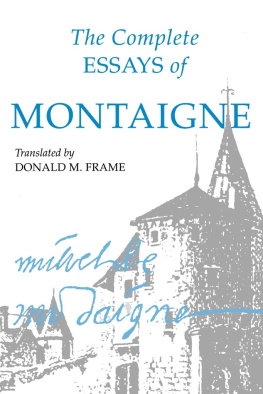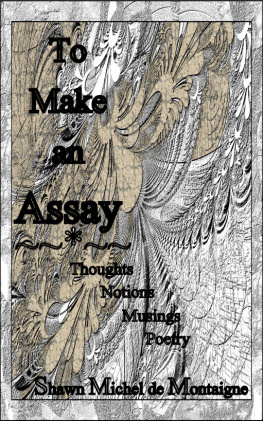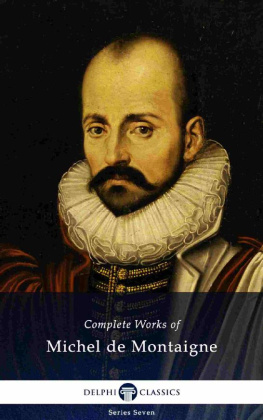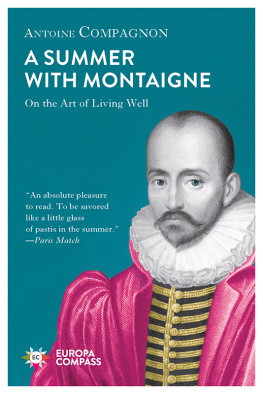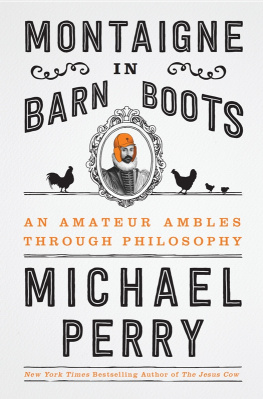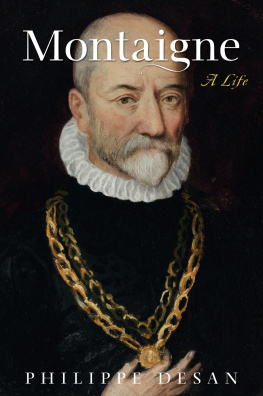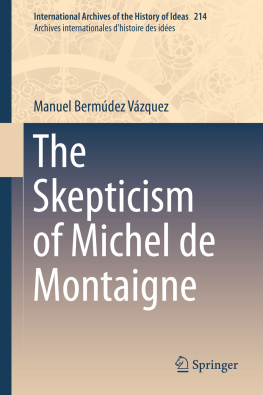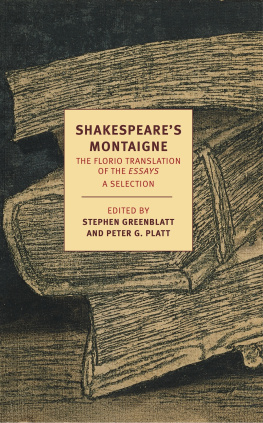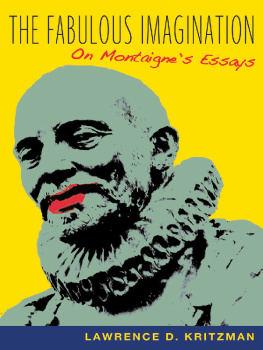Michel Eyquem Montaigne - The Complete Essays of Montaigne
Here you can read online Michel Eyquem Montaigne - The Complete Essays of Montaigne full text of the book (entire story) in english for free. Download pdf and epub, get meaning, cover and reviews about this ebook. year: 1958, publisher: Stanford University Press, genre: Science. Description of the work, (preface) as well as reviews are available. Best literature library LitArk.com created for fans of good reading and offers a wide selection of genres:
Romance novel
Science fiction
Adventure
Detective
Science
History
Home and family
Prose
Art
Politics
Computer
Non-fiction
Religion
Business
Children
Humor
Choose a favorite category and find really read worthwhile books. Enjoy immersion in the world of imagination, feel the emotions of the characters or learn something new for yourself, make an fascinating discovery.
- Book:The Complete Essays of Montaigne
- Author:
- Publisher:Stanford University Press
- Genre:
- Year:1958
- Rating:3 / 5
- Favourites:Add to favourites
- Your mark:
- 60
- 1
- 2
- 3
- 4
- 5
The Complete Essays of Montaigne: summary, description and annotation
We offer to read an annotation, description, summary or preface (depends on what the author of the book "The Complete Essays of Montaigne" wrote himself). If you haven't found the necessary information about the book — write in the comments, we will try to find it.
The Complete Essays of Montaigne — read online for free the complete book (whole text) full work
Below is the text of the book, divided by pages. System saving the place of the last page read, allows you to conveniently read the book "The Complete Essays of Montaigne" online for free, without having to search again every time where you left off. Put a bookmark, and you can go to the page where you finished reading at any time.
Font size:
Interval:
Bookmark:
The Complete Essays of
MONTAIGNE
Translated by
DONALD M. FRAME
Stanford University Press
Stanford, California
The Frame translation of the complete essays was initially published in 1957 in The Complete Works of Montaigne. The essays were issued separately under the present title in 1958, and as a Stanford paperback in 1965.
Stanford University Press, Stanford, California
Copyright 1943 by Donald M. Frame. Copyright 1948 by the Board of Trustees of the Leland Stanford Junior University.
Copyright renewed 1971, 1976 by Donald M. Frame. 1957, 1958 by the Board of Trustees of the Leland Stanford Junior University.
Printed in the United States of America
Cloth ISBN 0-8047-0485-6
Paper ISBN 0-8047-0486-4
Cloth ISBN 978-0-8047-0485-4
Paper ISBN 978-0-8047-0486-1
Electronic ISBN 978-0-8047-8077-3
Introduction
Montaigne resists simple definitions. He is the first essayist, a skeptic, an acute student of himself and of man, a champion of a man-based morality, a vivid and charming stylist, and many other things besides. No one description tells nearly enough, and indeed it is hard to see which one to place at the center.
Yet this very difficulty points to one answer: that the book is the man. Montaignes principal conscious aim was to make it so. I have no more made my book than my book has made me, he wrote; a book consubstantial with its author, concerned with my own self, an integral part of my life. In his concern to present himself exactly as he was, he addressed the reader in his natural, everyday language. I correct the faults of inadvertence, not those of habit, he once wrote in answer to a hypothetical critic of his style. Isnt this the way I speak everywhere? Dont I represent myself to the life? Enough, then. I have done what I wanted. Everyone recognizes me in my book, and my book in me (III: 5, p. 667). His greatest attraction for most readers is that the book reveals a man and that the man becomes a friend and often another self.
Rousseau resented the fact that the Essays were not frank enough to suit him; but Montaigne was not writing confessions. When he started his book he had lost a dear friend, Etienne de La Botie, to whom he had been able to express, as he never could to any one person again, his every thought, view, and feeling. Self-sufficient though he was, he had an imperious need to communicate. The Essays are his means of communication; the reader takes the place of the dead friend.
When we talk to a friend we do not constantly confess and plumb the depths of our soul; for to do so is to threaten, by excessive self-concern, the tacit equilibrium that friendship assumes and needs. Rather we talk about our hopes and fears, what has happened to us, what we have seen, heard, or read that has interested us, how we assess our own actions and those of others. And this is what Montaigne does. He has no use for the introverts anguish over the impenetrability of ultimates, the absurdity of mans place in the universe, or the discrepancy between our ideals and our attainments. The first two of these he accepts without despair as unfathomable data of human life. The third he seeks to resolve by introspective study of human nature and human conduct, over which we have some control. If by this practicality he loses a kind of depth, he gains in friendly communication with the reader; and this is what he wants.
A writer with whom we identify ourselves is naturally seen in as many lights as he has readers. We each have our own Montaigne, as we have our own Hamlet and Don Quixote. But this is not the only reason for the diversity of Montaignes public image. Writing as he did over a period of twenty years, from just under forty until his death, he changed as he wrote, recognized and accepted his change, and made his portrait vary to fit his own variation. I do not portray being, he wrote (III: 2, pp. 61011); I portray passing.... My history needs to be adapted to the moment.... I may indeed contradict myself now and then; but truth, as Demades said, I do not contradict.
Though the evolution of Montaignes ideas and attitudes is continuous and gradual, there are moments in his thought that have represented different Montaignes to different generations. His readers have seemed, in a sense, to grow older with him. The stoical humanist of the earliest essays was the Montaigne that his contemporaries saw, the one whom Estienne Pasquier called another Seneca in our language. In the seventeenth century the skeptical revolt against human presumption was seen as the center of Montaigne, the Apology for Raymond Sebond as the one important chapter, What do I know? as the essence of his thought. Descartes used his skepticism to show that we need a fresh start and that we cannot doubt without knowing at least that we are thinking when we do. Others earlier and later in the centuryMarston, Webster, and probably Shakespeare in England, Pascal in Francefound a source of cosmic despair in Montaignes eloquent catalogue of human limitations. A century after Pascal, Rousseau was struck by the self-portrait that had become Montaignes principal aim only after the Apology. Most modern readers, like Gide, are struck by the sturdy individualism, the faith in self, man, and nature, that emerge so triumphantly in the final Essays. All these attitudes are in Montaigne; none contains him.
The style of the Essays is part of the self-portrait. Free, oral, informal, personal, concrete, luxuriant in images, organic and spontaneous in order, ranging from the epigrammatic to the rambling and associative, it communicates the flavor of the man. Abstract notions live and move and breathe under his pen. Here is a sample, on borrowing ideas from others: The bees plunder the flowers here and there, but afterward they make of them honey, which is all theirs; it is no longer thyme or marjoram (I: 26, p. 111). Or again, on the theme that small learning makes for presumption, great learning for humility: To really learned men has happened what happens to ears of wheat: they rise high and lofty, heads erect and proud, as long as they are empty; but when they are full and swollen with grain in their ripeness, they begin to grow humble and lower their horns (II: 12, p. 370). The whole chapter on education (I: 26)a subject in which stylistic anemia is endemicis a stream of images as vivid as they are appropriate. Often Montaigne exemplifies ideas, with the same effect: complacency in the man who, after making a stupid speech, was heard in the lavatory muttering conscientiously that the credit belonged to God, not to himself; dogmatism in the donkey, earnest, contemplative, disdainful, resolute, cocksure; the narcissism of the creative artist in the friend who kept his diary by his daily chamber pots, and in whose nostrils all conversation on other subjects stank. Each reader can fill in his own favorite examples.
His concreteness is everywhere apparent. He himself tells us that the speech he loves is a speech succulent and sinewy, brief and compressed, not so much dainty and well-combed as vehement and brusque (1:26, p. 127). Flaubert described Montaignes style as a delicious fruit that fills your mouth and throat, so succulent that the juice goes right to your heart.
Sainte-Beuve summed it up superbly when he wrote: Montaignes style is a perpetual figure, renewed at every step; you receive his ideas only in images... Any one of his pages seems like the most fertile and wild of prairies, a free and untamed field: long, lusty grasses, perfumes underneath the thorn, a mosaic of flowers, singing insects, streams beneath, the whole thing teeming and rustling... Thought and image, with him, it is all one.
Michel de Montaigne was born in 1533 in his fathers chteau on one of the vine-covered hills that rise up from the gentle Dordogne about thirty miles east of Bordeaux. The chteau was a noble house (conferring minor nobility on its owner) which had been in the family for just over fifty-five years. Great-grandfather Ramon Eyquem had bought it in 1477, and his grandson Pierre Eyquem de Montaigne, Michels father, had enlarged and greatly improved it. The Eyquems were important and enterprising businessmen with an international trade in fish and wine; the family of Montaignes mother, Antoinette de Louppes (Lopez) of Toulouse, was of Spanish Jewish origin and equally important and prosperous. The children were brought up in the Catholic faith, and Montaigne himself, three brothers, and one sister remained in it, along with their parents; one brother and two sisters became Protestants. In an age of fierce religious passions the family atmosphere was tolerant.
Next pageFont size:
Interval:
Bookmark:
Similar books «The Complete Essays of Montaigne»
Look at similar books to The Complete Essays of Montaigne. We have selected literature similar in name and meaning in the hope of providing readers with more options to find new, interesting, not yet read works.
Discussion, reviews of the book The Complete Essays of Montaigne and just readers' own opinions. Leave your comments, write what you think about the work, its meaning or the main characters. Specify what exactly you liked and what you didn't like, and why you think so.

